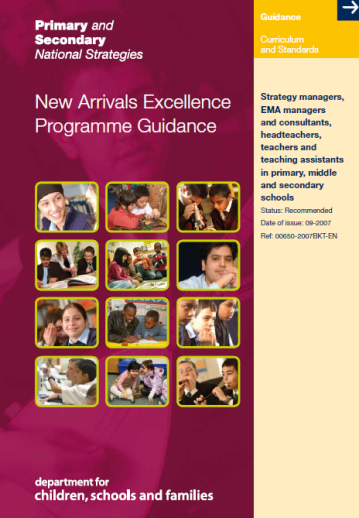Supporting New Arrivals, Refugees and Unaccompanied Asylum Seeking Children in our Schools
In Kent over 10% of our pupils in schools have English as an additional language, with the largest number of EAL learners in Gravesham, Dartford, Thanet and Ashford.
Between January 2015-16 Kent had 3218 minority ethnic new joiners to our schools (excluding Year R) and 2096 new joiners who speak English as an additional Language. The most commonly spoken languages in Kent schools, with more than 600 children and young people speaking a language other than English are Polish, Nepali, Slovak, Punjab, French, Tamil and Lithuanian.
Meeting the needs of new arrivals

With the number of Minority Ethnic and EAL Learners increasing from year to year, schools will continue to be welcoming new arrivals from other countries and strive to meet their needs.
These can vary as the new arrivals in your schools may be facing a number of challenges:
- Learning EAL
- Difficulties in managing the transition to a new country
- Feelings of insecurity or trauma due to prior experiences
- Isolation and lack of friends
- Separation from one or both parents, general changes in family situation
- No previous schooling due to a different starting age in their home country;
- Little, no or fractured previous education due to lack of opportunities or instability in their home country
- Different style or emphasis of prior education
- Feeling misunderstood, unvalued or alienated if they cannot see their culture, language, experiences reflected around the school or in the classroom
- Facing racism in or out of school.
How can we help?

The Inclusion Support Service Kent can offer consultancy, individual pupil/group support, training and advice to ensure that:
- The emotional and social needs of these children are met, by ensuring you have a robust induction process in place involving the child, family, appropriate staff and pupils within the school
- You are able to accurately assess both the linguistic and cognitive ability of the pupils to ensure that they are in the correct group/sets
- Your teaching and learning strategies enable your new arrivals to access the curriculum from day one
- All Staff have an understanding of EAL pedagogy.
CPD online training: Supporting Newly Arrived Pupils with English as additional language - 14/09/2016. If you have missed this training give us a ring and we may be able to put on another session or deliver this bespoke in your school.
Details on how to access our service can be found in our flyer - Support for EAL New Arrivals, Refugees and Unaccompanied asylum seeking children (PDF, 317.4 KB)
An oldie but a goody: New Arrivals Excellence Programme |
Funding available for Newly arrived pupils

Newly arrived learners to the UK declaring as EAL in the October census will receive funding for the first 3 years (Year Reception - Year 11) the following April.
- Primary £884.94,
- Secondary £3343.99
Unaccompanied asylum seeking children will also be entitled to pupil premium plus.
Pages

Contact Details

Gillie Heath, Manager
Telephone: 03000 41 70 93
Mobile: 07880 784528
Email: gillie.heath@theeducationpeople.org
